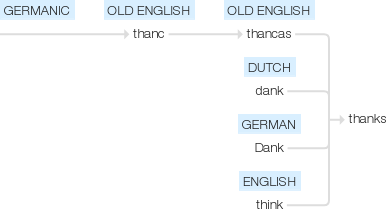Thanks
Old English thancas, plural of thanc ‘(kindly) thought, gratitude’, of Germanic origin; related to Dutch dank and German Dank, also to think.
wiktionary
From Middle English thanks, thankes, from Old English þancas(“thanks”), from Proto-Germanic *þankōs, nominative plural of *þankaz(“thought, gratitude”), from Proto-Indo-European *teng-(“to think, feel”). More at thank.
etymonline
thanks (n.)
mid-13c., plural of thank (n.), from Old English þanc, þonc in its secondary sense "grateful thought, gratitude," from Proto-Germanic *thanka-, from the same root as thank (v.). In prehistoric times the Germanic noun seems to have expanded from "a thinking of, a remembering" to also mean "remember fondly, think of with gratitude." Compare Old Saxon thank, Old Frisian thank, Old Norse þökk, Dutch dank, German Dank. The Old English noun chiefly meant "thought, reflection, sentiment; mind, will, purpose," also "grace, mercy, pardon; pleasure, satisfaction."
As short for I give you thanks from 1580s; often with extensions, such as thanks a lot (1908). Spelling thanx attested by 1907.
